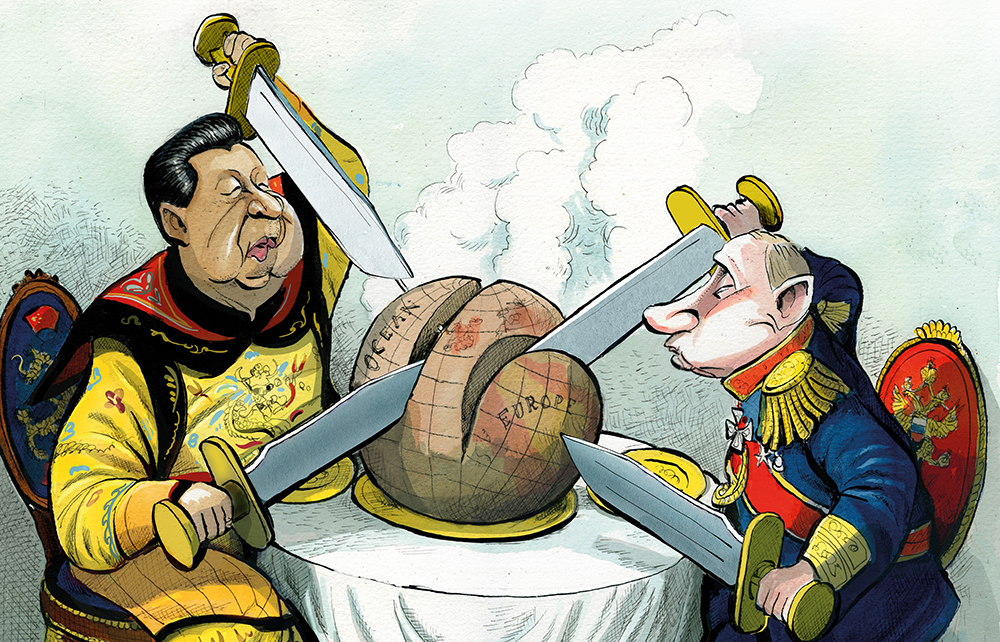Things are currently so bad in the western democracies that we tend to ignore how much worse they are in what one could politely call ‘non-democracies’. China’s policy of developing Covid in a lab, and then covering up its leak, seemed to work at the time. Western scientists, some corrupted by their links with China, helped persuade many that Beijing had the best policy for infection control. But it is increasingly clear that Chinese people themselves do not believe this and are rebelling. In Russia, Putin’s policy of war has isolated his country, humiliated his armed forces and bound his democratic enemies more closely even than did anti-Soviet feeling in the Cold War. In Iran, more than 300 people have been killed in riots against the oppression of women. Contrary to popular belief, it is much harder to run a dictatorship than a democracy. Rishi Sunak’s Lord Mayor’s Banquet speech on Monday developed the thought that our security and prosperity depend on ‘the depth of our partnerships’ with countries which, very roughly speaking, do not think like dictatorships. The countries he name-checked give clues to his thinking – the United States, Indonesia, Australia, Canada, Malaysia, Singapore, New Zealand, Japan, the Gulf States, Israel, India. Good European relationships were emphasised, but the EU countries he singled out were Sweden and Finland – because they are joining Nato. Together with its allies Britain would ‘protect the arteries and ventricles of the global economy’, the Prime Minister said. He was politely telling China that the free world will not permit its imperial Belt and Road Initiative to take over the globe. Good. It is not an original thought, but it has been neglected: consistently oppressive and violent powers consistently threaten the rest of us.
My friend the frontline doctor describes the feelings of nurses as they prepare to strike: ‘The interesting silent split,’ he writes, ‘is between the homegrown and the imported nursing staff. The homegrown have more grievances because of their student debt and perceived sacrifices.’ The foreign nurses see things differently, ‘Having come here for a better life, they are more accepting, not feeling politically involved in this country.’ This makes them agreeable employees: ‘Despite government assurances that homegrown nurses are the priority, they really are not. It is ultimately cheaper to steal the well-trained workforce of the Philippines, Nepal and India, and they cause so much less fuss.’ He adds this arresting thought about the dismal state of the NHS: ‘The prospect of not having nurses around for a day or two in some departments is no longer hugely terrifying. Every day features staff shortages and misery for patients. At least there will be some purpose to the misery on strike days.’
Intrinsic to the coming coronation, as to its predecessors, are numerous privileges, rights (and rites). Some of these – notably the right to be King – are hereditary. So it seems prudent to treat all such claims with respect. This is not happening. One right cherished in the south-east of England is the claim of the barons of the Cinque Ports. The original cinque are Hastings, New Romney, Hythe, Dover and Sandwich. The barons, nowadays mayoral and aldermanic choices, have the right to carry the canopy in the coronation procession. In 1902, Edward VII said he wanted no canopy, so the barons were invited to process without one, an invitation renewed at all subsequent coronations. This time, no baron of the Cinque Ports has heard anything. Natalie Elphicke, the MP for Dover, is reasonably asking why these historic ports are being ignored. They should be told by the Earl Marshal, the Duke of Norfolk, but – so far at least – not a dickie bird, a Sussex martlet or a bluebird over the white cliffs of Dover.
Frances Campbell-Preston, lady-in-waiting to the Queen Mother, recently died, aged 104, one of the last people with adult memories of events before the second world war. But she admitted she did not necessarily know much, in that era, about grown-up life. She told my sister (she was our remote cousin) that when she went to finishing school in Paris, her only excitements were thés dansants with young French officers and eating delicious pastries. Growing very stout and believing that one could be made pregnant by the touch of a man, especially a Frenchman, she concluded she was enceinte. She wrote home to inform her mother, who sent Frances’s sister out to check. Frances certainly looks pregnant, she reported. Summoned back to England, Frances was taken to a distinguished doctor. He declared her not pregnant, but too fat. He ordered that her ‘contours’ be hosed down and horse-brushed, actions performed by the butler as she stood in her bath. Her father forbade the doctor’s further prescription that she run round Hyde Park in a little vest. Her marriage, in 1938, put her right about pregnancy, producing four children.
My old friend Edward Stourton has entered the debate about BBC accents, but is too gentlemanly to point out that he was denied a permanent place on the Today programme because he sounded ‘too posh’. Edward calls for a truce, saying that what matter are clarity and authority, not class. This is the truth, but not the whole truth. We supporters of received pronunciation should admit that we like it not only for its clarity, but for its air of education. This is one reason, for example, why Sir David Attenborough remains a deity of the BBC. An educated accent is not the same as an upper-class accent, but it does carry a class register – the tone of people who have encountered what Matthew Arnold called ‘the best that is thought and known’. One of my two objections to Amol Rajan’s ‘mockney’ accent is that it seeks to conceal his high (Oxbridge) education, thus implicitly scorning Arnoldianism. My other is that it is consequently very hard to understand.







Comments